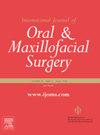全喉切除术合并喉切除术后的功能预后和存活率:系统性综述。
IF 2.7
3区 医学
Q2 DENTISTRY, ORAL SURGERY & MEDICINE
International journal of oral and maxillofacial surgery
Pub Date : 2025-02-01
DOI:10.1016/j.ijom.2024.07.005
引用次数: 0
摘要
全喉切除术(TGL)是一种具有高发病率/死亡率风险的手术,专门用于晚期舌癌伴喉侵犯的病例。这项技术对生活质量有很大影响,包括丧失语言和吞咽功能,因此备受争议。我们按照 PRISMA 指南进行了一项系统性综述,主要目的是量化接受 TGL 治疗的患者的功能结果和总生存率。最初的搜索结果是 748 项研究,其中 7 项符合纳入标准。五项研究对术后功能性言语进行了评估,在这些研究中,12.1%(8/66)的患者实现了某种形式的功能性言语。大多数研究并未提及术后嗓音康复的具体应用。在吞咽功能方面,5 项研究中 53.3%(32/60)的患者恢复了吞咽能力。在六项报告胃造瘘管依赖性的研究中,37.7%(29/77)的患者依赖胃造瘘管。有三项研究报告了 1 年内复发的情况;52%(26/50)的患者在 1 年内复发,1 年无病生存率为 48%。TGL 是一种高度侵入性手术;术后,大多数患者无法恢复说话能力,只有一半患者能够吞咽。尽管患者做出了极大的努力和牺牲,但仍有大约一半的患者在第一年内复发。只有经过仔细解释并权衡肿瘤学和生活质量方面的风险和益处后,才能选择对积极主动的患者实施 TGL。本文章由计算机程序翻译,如有差异,请以英文原文为准。
Functional outcomes and survival after total glossectomy with laryngectomy: a systematic review
Total glossectomy with laryngectomy (TGL) is a procedure with high morbidity/mortality risks reserved for cases of advanced tongue cancer with laryngeal invasion. This technique is controversial as there are significant impacts on quality of life, including loss of functional speech and swallowing. A systematic review was performed following the PRISMA guidelines with the primary goal of quantifying the functional outcomes and overall survival of patients undergoing TGL. The initial search resulted in 748 studies; seven of these met the inclusion criteria. Five studies evaluated functional speech postoperatively, and 12.1% (8/66) of patients in these studies achieved a form of functional speech. Most studies did not refer to the use of specific postoperative voice rehabilitation. Regarding swallowing function, 53.3% (32/60) of patients in five studies regained their ability to swallow. In six studies reporting gastrostomy tube dependence, 37.7% (29/77) of patients were tube-dependent. Recurrence within 1-year was reported in three studies; 52% (26/50) of the patients had recurrence within 1 year, and the 1-year disease-free survival rate was 48%. TGL is a highly invasive surgery; postoperatively, most patients do not regain the ability to speak, while only half are able to swallow. Despite these extreme efforts and sacrifices by the patient, approximately half of patients have a recurrence within the first year. The decision to perform a TGL should be made only in select and motivated patients after carefully explaining and weighing the oncological and quality of life risks and benefits.
求助全文
通过发布文献求助,成功后即可免费获取论文全文。
去求助
来源期刊
CiteScore
5.10
自引率
4.20%
发文量
318
审稿时长
78 days
期刊介绍:
The International Journal of Oral & Maxillofacial Surgery is one of the leading journals in oral and maxillofacial surgery in the world. The Journal publishes papers of the highest scientific merit and widest possible scope on work in oral and maxillofacial surgery and supporting specialties.
The Journal is divided into sections, ensuring every aspect of oral and maxillofacial surgery is covered fully through a range of invited review articles, leading clinical and research articles, technical notes, abstracts, case reports and others. The sections include:
• Congenital and craniofacial deformities
• Orthognathic Surgery/Aesthetic facial surgery
• Trauma
• TMJ disorders
• Head and neck oncology
• Reconstructive surgery
• Implantology/Dentoalveolar surgery
• Clinical Pathology
• Oral Medicine
• Research and emerging technologies.

 求助内容:
求助内容: 应助结果提醒方式:
应助结果提醒方式:


